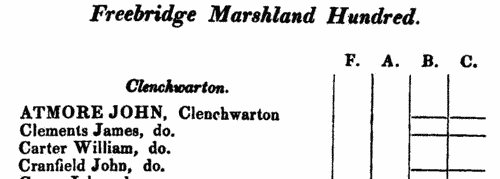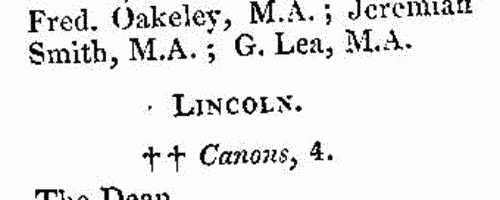Maddy Surname Ancestry ResultsOur indexes 1000-1999 include entries for the spelling 'maddy'. In the period you have requested, we have the following 85 records (displaying 51 to 60): Single Surname Subscription | | | Buying all 85 results of this search individually would cost £492.00. But you can have free access to all 85 records for a year, to view, to save and print, for £100. Save £392.00. More... |
These sample scans are from the original record. You will get scans of the full pages or articles where the surname you searched for has been found. Your web browser may prevent the sample windows from opening; in this case please change your browser settings to allow pop-up windows from this site. Liverpool Voters: West Derby
(1832)
A poll for the election of Members of Parliament for the Borough of Liverpool, between William Ewart esquire (E), Lord Viscount Sandon (S), Thomas Thornely esquire (T) and Major-General Sir Howard Douglas, baronet (D), took place on 12 and 13 December 1832. The poll book lists all voters with full name (surname first), occupation, address, and initials indicating for whom they voted. The lists are in six sections: Everton, Kirkdale, the parish of Liverpool, Toxteth Park, West Derby, and Liverpool burgesses and freemen. All householders of property worth £10 a year of more were entitled to vote.MADDY. Cost: £6.00.  | Sample scan, click to enlarge

| Deaths, Marriages, News and Promotions
(1834)
Death notices and obituaries, marriage and birth notices, civil and military promotions, clerical preferments and domestic occurrences, as reported in the Gentleman's Magazine. Mostly from England and Wales, but items from Ireland, Scotland and abroad.
MADDY. Cost: £4.00.  | Sample scan, click to enlarge

| Insolvents
(1835)
Insolvency notices for England and Wales: insolvency often caused people to restart their lives elsewhere, so these are an important source for lost linksMADDY. Cost: £6.00.  | Sample scan, click to enlarge

| Voters in the Western Division of Norfolk, for the parish of Old Buckenham
(1837)
Under the Reform Act of 1832, the County of Norfolk was allotted four Members of Parliament, being two Knights of the Shire for the Eastern Division and two for the Western. The Western Division included the hundreds of Brothercross, Clackclose, Freebridge Lynn, Freebridge Marshland, Gallow, North Greenhoe, South Greenhow, Grimshoe, Guiltcross, Holt, Launditch, Mitford, Shropham, Smithdon and Wayland. Polling in 1837 took place at Swaffham, Downham, Fakenham, Lynn Regis, Thetford and East Dereham. The franchise was available to freeholders worth 40s a year or over; copyholders and long leaseholders of £10 or more; short leaseholders and tenants of £50 or more: but limited to adult males. Voting took place on 1 and 2 August 1837. This poll book lists the voters for each parish, with the votes cast. Each voter had two votes: the votes are indicated in the columns F. (Sir William Henry Browne Folkes, 2838); A. (Sir Jacob Astley, 2713); B. (William Bagge, 3178); and C. (William Lyde Wiggett Chute, 2877). The voters were not necessarily resident in the parish, but derived their franchise from the land there; so some of the names have addresses outside the parish, not a few living in different counties. Not everyone voted, but everyone with a vote was listed in the poll book: persons who qualified for voting in two parishes (but nevertheless had just the one vote per person) are noted as such.MADDY. Cost: £6.00.  | Sample scan, click to enlarge

| Electors of Carleton-Rode
(1840)
The register of electors entitled to vote in any parliamentary election for East Norfolk between 1 November 1840 and 1 November 1841 lists 8,556 freeholders arranged by hundred and within hundred by parish or township &c. In the first column, after number within the register, the elector's name is given (surname first); the second column gives place of abode; the third column the nature of qualification (such as 'owner and occupier'); and the fourth column the address of the qualifying property, in some cases with the name of the tenant or occupier.MADDY. Cost: £4.00.  | Sample scan, click to enlarge

| Electors of Old Buckenham
(1840)
The register of electors entitled to vote in any parliamentary election for West Norfolk between 1 November 1840 and 1 November 1841 lists 7,620 freeholders arranged by hundred and within hundred by parish or township &c. In the first column, after number within the register, the elector's name is given (surname first); the second column gives place of abode; the third column the nature of qualification (such as 'owner and occupier'); and the fourth column the address of the qualifying property, in some cases with the name of the tenant or occupier.MADDY. Cost: £4.00.  | Sample scan, click to enlarge

| Churchmen and church officers in England and Wales
(1841)
The Royal Kalendar has an extensive ecclesiastical section, giving the names of officials at the College of Doctors of (church) Law, the Ecclesiastical Courts, and the ecclesiastical law proctors; deans, chancellors, archdeacons, canons and prebendaries for all the dioceses of England and Wales; the officers and fellows (being all the parish priests within and without the walls of London) of Sion College; and the incumbents of the parishes within ten miles of London (annotated to show whether rectors, vicars or curates, and with the net annual revenue of each cure); the Ecclesiastical Commissioners for England; the Committee of Council on Education; and then the officers of the various religious societies (Queen Anne's Bounty Office, and First-Fruits and Tenths Offices; Commissioners for Building Additional Churches; Society for Promoting the Building of Churches and Chapels; Anniversary Festival of the Sons of the Clergy; Society for Promoting Christian Knowledge; Society for the Propagation of the Gospel in Foreign Parts; Dissenters' Library; Society for Maintaining and Educating Poor Orphans of Clergymen of the Established Church; Society for Promoting Religious Knowledge; Patrons of the Anniversary of the Charity Schools; Naval and Military Bible Society; Society for the Support and Encouragement of Sunday Schools throughout the British Dominions; Society for Extending the Christian Faith in the British West India Islands; London Missionary Society; Religious Tract Society; Society for the Suppression of Vice; British and Foreign Bible Society; Church Missionary Society; Prayer Book and Homily Society; Dr Bray's Institution; London Society for Promoting Christianity among the Jews; National Society for the Education of the Poor in the Principles of the Established Church; Church Pastoral Aid Society; European Missionary Society; British Society for Promoting the Religious Principles of the Reformation; and the Protestant Association).MADDY. Cost: £6.00.  | Sample scan, click to enlarge

| The household of Queen Victoria
(1841)
The Royal Kalendar lists the staff of the royal household: the Lord Chamberlain's Department (including the Keeper of her Majesty's Privy Purse, the Master of the Ceremonies, the Mistress of the Robes, the Ladies of the Bedchamber, Maids of Honour, Bedchamber Women, Lords in Waiting, Grooms in Waiting, Gentlemen Ushers, Quarterly Waiters in Ordinary and Grooms); the Office of the Robes (including Pages, Gentlemen of the Privy Chamber and Sergeants at Arms); the Band of Music; Medical Department; Chapel Royal; Lord Steward's Department (including the Board of Green Cloth, Ewry, Wine and Beer Cellars, Kitchen, Confectionery, Silver Pantry, Coal Yard, Servants Hall, State Porters, Court of Marshalsea, Marshalsea Prison, Almonry, and Gardners; Gentlemen-at-Arms; the Queen's Stables, the Master of the Horse's Department, and the Royal Hunt.MADDY. Cost: £6.00.  | Sample scan, click to enlarge

|  Persons of standing recommending London police recruits
(1830-1842) Persons of standing recommending London police recruits
(1830-1842)
The Metropolitan Police Register of Joiners (MEPO 333/4) lists policemen joining the force through to 31 December 1842 (to warrant number 19892). The register is alphabetical, in so far as the recruits are listed chronologically grouped under first letter of surname. It is evidently a continuation of a similar earlier register, not closed until its alphabetical sections were filled: consequently, there are no entries in this register for the initial letters N, O, Q, U, V, X, Y or Z; and the sections of this register start at different dates - A 18 April 1840 (warrant number 16894); B 11 December 1830 (5570); C 7 September 1830 (4988); D 27 May 1833 (8445); E 15 December 1838 (14476); F 30 March 1832 (7372); G 1 December 1835 (11,184); H 25 April 1832 (7457); I and J 13 February 1837 (12449); K 2 January 1838 (13457); L 3 October 1834 (9905); M 15 November 1832 (7999); P 4 October 1831 (6869); R 4 September 1837 (13021); S 30 March 1835 (10366); T 6 April 1840 (16829); W 30 December 1833 (9096). The register gives Date of Appointment, Name, Number of Warrant, Cause of Removal from Force (resigned, dismissed, promoted or died), and Date of Removal. Those recruits not formerly in the police, the army, or some government department, were required to provide (normally) at least two letters of recommendation from persons of standing, and details of these are entered on the facing pages: the names in these are indexed here (the police recruits are indexed separately and not included here). Recruits transferred from other forces or rejoining the force did not normally need recommendations - in the latter case, former warrant numbers are given - but some recommendations are from police inspectors, even other constables. Recruits coming from the army sometimes have general military certificates of good conduct, but most often have a letter from their former commanding officer; recruits recommended by government departments (most often the Home Office) similarly have letters from the head of department. But the great majority of the names and addresses in these pages are of respectable citizens having some sort of personal acquaintance with the recruit. Where more than two recommendations were provided, the clerk would only record one or two, with the words 'and others'. Tradesmen are sometimes identified as such by their occupations; there are some gentry. Although the great bulk of these names are from London and the home counties, a scattering are from further afield throughout Britain and Ireland. MADDY. Cost: £8.00.  | Sample scan, click to enlarge

| Railway Subscription Contracts
(1845)
£21,386,703 6s 4d was promised by about 10,000 subscribers of less than £2,000 per contract to the nearly 200 railway bills deposited in the Private Bill Office during the Session of Parliament for 1845. This alphabetical list gives the full names of the subscribers (surname first), description (i. e., occupation), place of abode, a numerical reference to the title of the railway, the amount subscribed to each, and total. There is a separate key to the titles of the railways.MADDY. Cost: £4.00.  | Sample scan, click to enlarge

|
Research your ancestry, family history, genealogy and one-name study by direct access to original records and archives indexed by surname.
|













